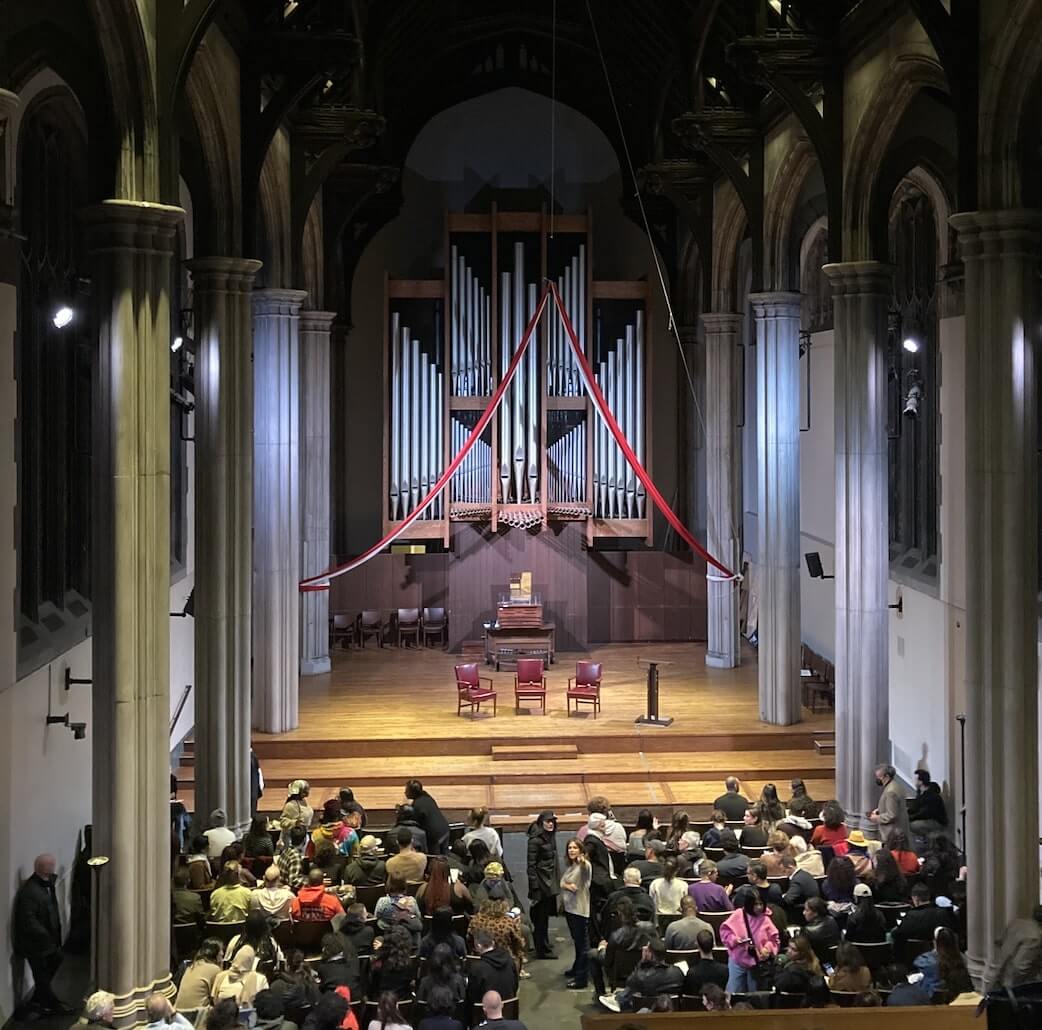‘But we must speak’: Palestinian scholars, activists, allies address packed Manhattan crowd
A literary event drew comparisons between Jim Crow America and modern-day Israel, and asked American observers to stand up for Palestinian rights

A literary event organized by the Palestinian Festival of Literature filled a hall at Union Theological Seminary to capacity. Photo by Irene Katz Connelly
I arrived at Manhattan’s Union Theological Seminary just in time to see a truck displaying the names and faces of “Columbia’s Leading Antisemites” speeding down Broadway.
The so-called antisemites were allegedly members of college organizations that signed a statement that framed Hamas’ Oct. 7 massacre as the inevitable result of Israel’s occupation and “apartheid and colonial system.” They were also, as the cheerful, yearbook-style photos made clear, teenagers. Few people in the line rapidly forming in front of the seminary’s neo-Gothic building even glanced at the truck, which was sponsored by Accuracy in Media, a conservative group that uses public shaming to combat what it sees as liberal bias. Perhaps the “doxxing truck,” which first appeared on campus a week before and has sparked fierce protest from students, had become so common a sight as to be unremarkable.
The current climate at Columbia and other college campuses, in which students expressing pro-Palestinian views face not just disagreement but personal intimidation, likely contributed to the turnout at a Wednesday evening literary event organized by the Palestine Festival of Literature, titled “But We Must Speak: On Palestine and the Mandates of Conscience.” So did the roster of high-profile speakers, which included the writer Ta-Nehisi Coates; the poets Mohammed El-Kurd and Natalie Diaz; and Rashid Khalidi and Noura Erakat, scholars of Palestinian history and legal theory, respectively, who have gained popularity as skilled commenters in a cable news landscape often perceived as hostile to Palestinian perspectives.
Although I was standing toward the front of the line, I was one of the last people allowed in the venue. An overflow room at nearby Riverside Church, where the event was broadcasted on a screen, quickly filled to capacity, while over 2,000 others watched remotely via livestream. Ushers initially allowed so many people into the main room that they had to prevail upon some to leave in order to comply with safety regulations.
Yasmin El-Rifae, a producer for the Palestine Festival of Literature, cited those numbers as evidence that despite the mounting death toll of Israel’s retaliatory airstrikes and the violence facing Palestinians now — many festival participants in Gaza, she said, had stopped answering messages, while others were fleeing increased settler attacks in the West Bank — they didn’t lack international support.
Michelle Alexander, a civil rights lawyer and historian who has been a vocal advocate for Palestinian rights, opened the event by noting that Martin Luther King Jr. had originally planned to give his 1967 speech opposing the Vietnam War in the very room where we were sitting. (King ultimately spoke at Riverside Church.) This wasn’t a random factoid: Throughout the night, speakers drew connections between the fight for Palestinian freedom today and earlier American movements to enshrine civil rights and end the Vietnam War.
A pastor read excerpts from King’s historic speech. Coates, describing a highly militarized landscape of checkpoints, barriers on individual movement, and segregated roads he observed on a trip to Israel, compared the country to the United States in the Jim Crow era. Khalidi argued that the American government’s “unwavering” support of Israel stems less from genuine commitment to Jewish safety than cynical concern for economic interests.
“Israel is the only democracy in the Middle East in the same way that America is the oldest democracy in the world,” Khalidi said.
Wednesday’s speeches and readings took place against a backdrop of widespread cancellations of events featuring Palestinian artists or advocates. In the wake of the Oct. 7 attack and Israel’s retaliatory bombardment of Gaza, book launches, film festivals and non-profit conferences have been postponed, moved online or scrapped altogether. Multiple speakers warned of “McCarthyite” repression of Palestinian voices.
“Many people are closing their doors to these vital conversations,” Alexander said.
The night also included gestures to Jewish-Palestinian solidarity. A letter from the Jewish Voice for Peace Rabbinical Council earned a standing ovation. While celebrations of Israeli deaths on social media and at some pro-Palestinian rallies have exposed fault lines among leftist critics of Israel’s occupation, Alexander explicitly condemned antisemitism and Islamophobia in progressive spaces, and argued that international observers must speak out on behalf of both Palestinians living under occupation and “Jewish children brutally murdered in the name of liberation.”
In a culminating speech, Erakat, the legal scholar, argued that international law requires Israel, as an occupying power that controls most aspects of life in Gaza, to protect the very people it is currently bombarding. But she also urged the audience not to lose sight of the war’s immense human toll in theoretical discussions.
“My heart breaks over and over every day,” Erakat said, referencing a Gazan journalist who learned that an Israeli airstrike killed his wife and children while reporting on-air. “I cannot take another young girl running after her mother’s corpse, asking her to get up.”
Erakat and El-Rifae ended the night with pleas to donate to Palestine Legal, a law firm that has reported hundreds of incidents of anti-Palestinian harassment and intimidation since Oct. 7. “We have work to do,” El-Rifae said, dismissing the crowd.
Outside, it was dark, and the “doxxing truck” was nowhere to be found. Nor did its power to intimidate students seem quite so unassailable. The audience dispersed quickly and quietly. They had work to do.

















